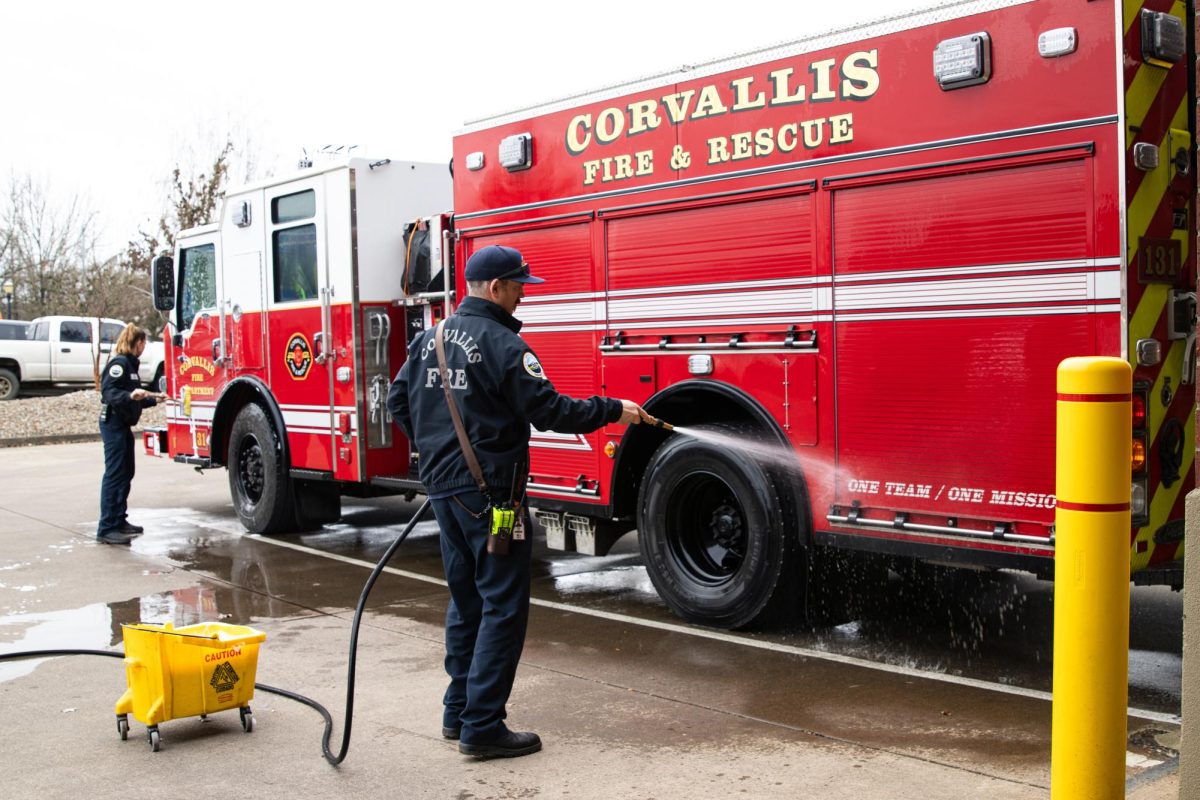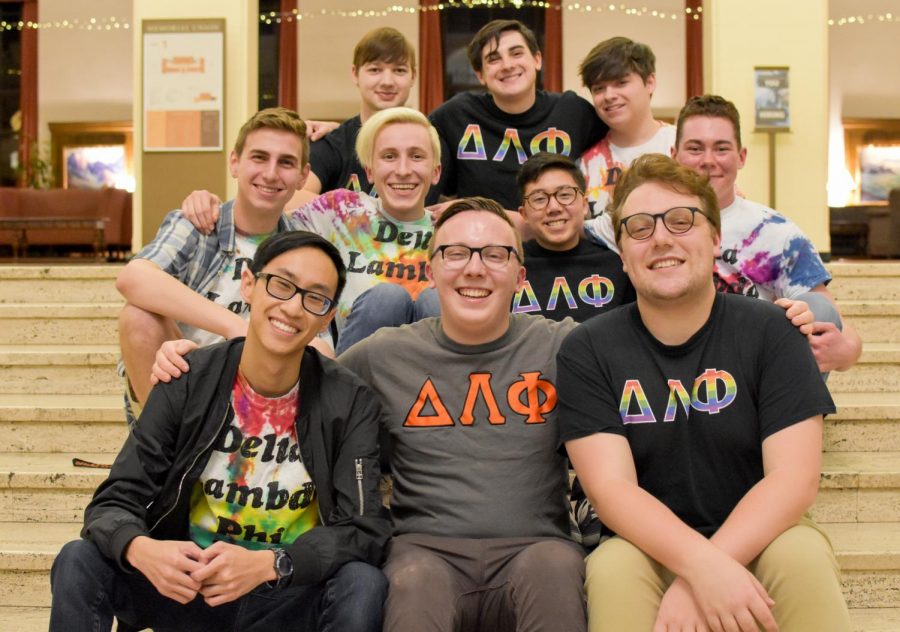Center for Fraternity and Sorority Life provide inclusive spaces for LGBTQIA+
January 29, 2018
Delta Lambda Phi serves as Oregon State University’s only open chapter.
“To develop dignified and purposeful social, service, and recreational activities for all men, irrespective of sexual orientation or gender expression. To lead in determining the rights and privileges of individuals in society. To present a strong and positive image, which respects the diversity of all individuals.”
These are the mission statements of Delta Lambda Phi, an Oregon State University fraternity colony founded by student Cory Zimmerman in 2015, as found on the fraternity’s webpage.
Delta Lambda Phi serves to be an inclusive space for LGBTQIA+ students, according to Zimmerman. The colony creates a safe haven for fraternity colonists who identify as non-cisgender in any form, and provides resources for LGBTQIA+ and non-LGBTQIA+ community members.
“Delta Lambda Phi is a fraternity for all men regardless of sexual orientation or gender expression. Our group does a great job with respecting our members or potential members identities,” Zimmerman said in an email. “We have a sort of unspoken rule in our group that we aren’t meant to ask anyone about their identities unless that person feels they can share it.”
The fraternity originated in Washington D.C. in 1987, according to Zimmerman, and has slowly grown since.
“Our founder, Vernon L Strickland, was talking about his experience in another fraternity with a group of older gentlemen and how he wished that there was a group for gay, bisexual, trans and queer men,” Zimmerman said in an email. “The older men agreed with him and Strickland decided to start
the group there.”
The first recruitment event for Delta Lambda Phi was held in late February of 1987, and the first class of recruits were inducted in April of the same year, according to Zimmerman.
According to Leslie Schacht Drey, the assistant dean of Student Life and director of the Center for Fraternity and Sorority Life, Delta Lambda Phi is the first fraternity or sorority at Oregon State University with an expressed LGBTQIA+ interest.
“There has been some interest in bringing a sorority to OSU with a similar LGBTQIA+ interest, and this would be an effort that the Center for Fraternity & Sorority Life would be eager to support if interested students wanted to pursue founding such a chapter,” Schacht Drey said in an email. “I have been impressed by fraternity/sorority student leaders in their efforts to support one another and in particular, new groups that have joined the community.”
Delta Lambda Phi is currently presided over by Justin Chau. According to Chau, Delta Lambda Phi is in its beginning stages of establishment.
“Colonies (like ours) are chapters-in-training, and must go through a chartering process to become an official chapter, in which we need at least a Delta class (4th class of members) to begin,” Chau said in an email. “Because we are not a chapter yet, we are called ‘colonists’ instead of ‘brothers’—they are essentially the same, but for technical reasons, we use the term ‘colonists.’ Colonists are able to help determine colony operations.”
According to Chau, outside concerns of accepting gender-fluid, non-binary or transgender men to the fraternity come to question, as fraternity and sorority life have traditionally operated on a cisgender
male/female binary.
“As minorities in many aspects, our members have all gone through adversity. Therefore, we strive to create an environment where people are free to be who they want to be,” Chau said in an email. “I believe that as ‘transgender’ and ‘gender expression’ continue to be defined and redefined in the future, we shall reevaluate our rules of invitation.”
Greek non-LGBTQIA+ allies can also work to make the overall community more welcoming, according to Chau.
“Non-LGBTQIA+ fraternity and sorority members can support their LGBTQIA+ counterparts by being allies—help us in the fight for equality and against homophobia/biphobia/transphobia/etc,” Chau said via email. “Other than that, treat us as you would treat anyone else! Sexual orientation should not be the deciding factor for many things.”
For allies, Greek or not, Zimmerman offers insight to approaching a
potentially sensitive situation.
“Every person is different and one LGBTQIA+ person may not require the same kind of support as another. The easiest thing to do would be to ask them,” Zimmerman said in an email. “They may just want you to treat them as you’d treat anyone else or they may want you to help in the community more. The question could be awkward but in the end, it’ll benefit you both so you know you’re supporting your friend in all the right ways.”
According to Schacht Drey, self-reflection and analysis is one way the community can challenge common perceptions about Fraternity and Sorority Life.
“Gender-normative and heteronormative behaviors and traditions can be barriers to making many students feel welcome or like they can find their place in the fraternity/sorority community,” Schacht Drey said in an email. “By analyzing individual organizations or community-wide traditions and events, it creates the opportunity for students to determine if these behaviors align with an inclusive environment where individuals from diverse identities will feel welcome.”
According to Zimmerman, he has been a resource for other members with questions regarding the LGBTQIA+ community. Delta Lambda Phi is altogether an active resource within both the Greek and LGBTQIA+ communities on campus.
“As we are a new group, we are trying to become more involved in those communities,” Zimmerman said in an email. “We always go to the Fall and Spring Drag Shows hosted by Rainbow Continuum and we’re trying to become more active in the Pride Center as a whole.”
Like other fraternities and sororities, Delta Lambda Phi also contributes to public service, according to Zimmerman.
“For our fraternity, we actually require all of our members to complete at least two hours of community service a term but we encourage that they do more,” Zimmerman said in an email. “We always tell our members that the Pride Center can always use some help and that they should swing by even if they just want a space to relax between classes.”
According to Schacht Drey, there are programs on other campuses for members of fraternities and sororities who identify as LGBTQIA+.
“Several other fraternity/sorority communities have an ‘Out and Greek’ group on their campus that consists of fraternity/sorority members who identify as a member of the LGBTQIA+ community,” Schacht Drey said via email. “There has been some interest in founding a similar organization within the fraternity/sorority community at OSU, and the Center for Fraternity & Sorority Life would eagerly support the development and growth of such an organization.”
Altogether, Zimmerman expresses inclusivity of spaces, especially for LGBTQIA+ students who are hesitant to join.
“For any closeted men or women in a fraternity or sorority at Oregon State, I just want you to know that you have a space in Delta Lambda Phi,” Zimmerman said in an email. “You may not be able to join but if you ever need to talk to any of us about anything, please do because we want to be the resource for folks who may be struggling with coming out to their brothers or sisters.”


















































































![Newspaper clipping from February 25, 1970 in the Daily Barometer showing an article written by Bob Allen, past Barometer Editor. This article was written to spotlight both the student body’s lack of participation with student government at the time in conjunction with their class representatives response. [It’s important to note ASOSU was not structured identically to today’s standards, likely having a president on behalf of each class work together as one entity as opposed to one president representing all classes.]](https://dailybaro.orangemedianetwork.com/wp-content/uploads/2025/03/Screenshot-2025-03-12-1.00.42-PM-e1741811160853.png)
























